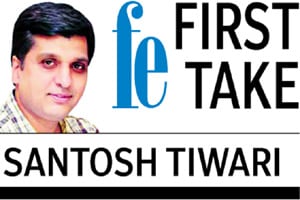 All political parties understand that higher tax rate can derail the goods and services tax (GST) and it has to be kept, as lower than 18%, as possible. The Congress demand of capping it at 18%, therefore, has been meaningless.
All political parties understand that higher tax rate can derail the goods and services tax (GST) and it has to be kept, as lower than 18%, as possible. The Congress demand of capping it at 18%, therefore, has been meaningless.
The Monsoon Session of Parliament, starting on Monday, appears to witness the passage of the long-pending goods and services tax (GST) Bill.
Sensing the possibility of getting isolated in the Rajya Sabha if it continues to block the Bill, the Congress party is now trying to find a way out to ensure that its demand of capping the GST rate at 18% is met while the deadlock over the passage of the GST Bill ends in the Rajya Sabha, where the NDA lacks a majority.
The party now appears to be agreeing for capping of the tax rate in the statute as against its earlier demand of the rate ceiling be specified in the Constitution itself.
[related-post]
Considering most of the opposition parties other than the Congress party, AIADMK has some reservations but it is also expected to support the Bill ultimately, are in favour of passing the GST Bill, it is only a matter of time when it becomes a reality.
The advantage of getting the GST Constitutional Amendment Bill passed in the current session will be that the integrated indirect tax system could be implemented from April 1, 2017, across the country.
The Bill seeks to amend the Constitution to introduce GST by providing Parliament and state legislatures concurrent powers to make laws on GST.
In the new system, the GST Council comprising the union finance minister and the minister of state for revenue and the state finance ministers, will have the responsibility of recommending rates of tax, period of levy of any additional tax, along with the principles of supply, and special provisions for a particular state.
Under the GST regime, all indirect taxes, both at the Central as well as the state level, will be subsumed in one tax, removing the current cascading of taxes and increasing compliance with broadening of the tax base.
Though Congress-led UPA initiated the process for bringing in the GST, its opposition to the GST Bill now has ensured that it is stuck in the Rajya Sabha.
While it is true that high rate can be a big dampener for GST, the Congress opposition to the indirect tax reform in the garb of this argument, is more to assert its strength.
No political dispensation can afford to keep the GST rate so high that the whole reform process becomes regressive. So, the rate has to be, as lower than even 18%, as possible.
There is no point, therefore, in delaying the passage of GST Bill further to have more discussions and the Congress party must help in completing this process gracefully.


